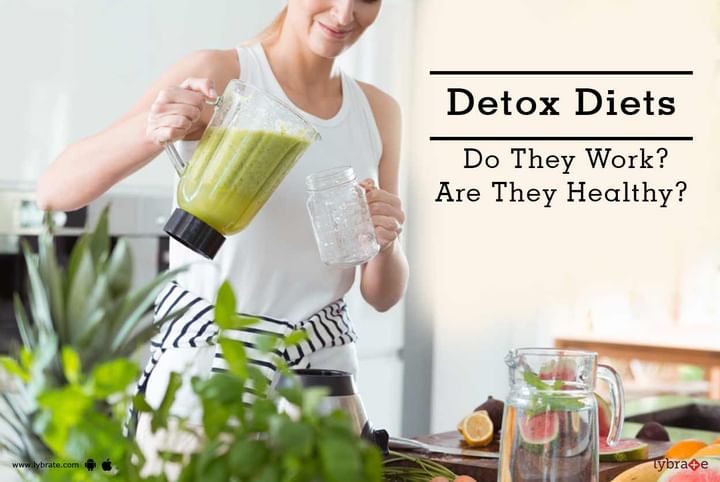Detox Diets - Do They Work? Are They Healthy?
Given that detox diets won't rid the body of impurities or lead to real weight loss, are there any benefits of using them?
The only thing one can say positively is that:
A detox diet may encourage you to eat more nutritious foods. Some detox diets recommend nutrient-rich foods like:
- lemons
- green tea
- fruit juices
- colorful fruits and vegetables
All of these could, in part, increase your intake of certain nutrients. Some of which might help the body deal with incoming toxins or offer other health benefits.However, a three day detox diet won't move the dial on toxicity (or health) anywhere near as much as maintaining a healthy lifestyle the other 362 days of the year.
Disadvantages of detox diets:
For most people, the disadvantages of a detox diet are much more numerous than the potential benefit.
1. Detox diets are often inconvenient:
Any diet will take some effort to organize, and detox diets are no exception. Ironically, you'll probably never put as much work into eating less as you do into a detox. People with limited time, money, and resources won't enjoy juicing seven kgs of veggies and fruits each day. Especially if they're feeling weak, listless, or dizzy, some of the most frequently reported side effects of juice cleanses.
2. Detox diets are often too low in energy:
Most juice diets are extremely low in calories. In fact, some people argue that juicing is just a way to starve and feel good about it. With the low energy intake you'll often notice other things slowing down, you may feel colder, or sluggish, or notice digestion taking a while.
Detox diets may cause blood sugar swings that is cleansing built on fruit juices can cause major swings in blood sugar, making them downright dangerous for people with diabetes, and potentially risky for many others.
Detox diets can be tough on your GI tract:
The fruit juices used for many detox diets contain very little fiber. Fiber is a cleanser. It's like a street sweeper for the GI tract; it slows down digestion and aids absorption of nutrients.
There is no credible information saying that the GI tract does better when it doesn't get solid foods (unless the GI tract is damaged). Instead, the gut does well with probiotics, glutamine from protein rich foods, and fiber. You'll struggle to get all of these on a cleanse.
Detox diets are often low in essential fats.
While some less extreme detox diets allow things like nuts and seeds, hard core cleanses typically eliminate most fat-containing foods, even healthy fats. Extreme variations in fat intake i.e. swinging from high (pre-cleanse) to low (cleanse) to high (post-cleanse celebration) to low (back on the cleanse train again) can cause trouble for organs that process dietary fats, like the gallbladder.
Detox diets may cause electrolyte imbalances:
Many cleanses involve drinking a lot of liquid (such as water, herbal teas, and/or juices) while removing many foods that contain salts. Some "detox diets" also suggest using diuretic supplements. This can cause potentially dangerous imbalances in your electrolytes, charged chemicals found in fluids throughout your body. The imbalance is even more likely if overhydration is combined with low energy intake.
In fact, there's a name for this phenomenon, well known to health care providers who deal with extreme anorexia, malnutrition, or any medical condition with severely restricted food intake that is refeeding syndrome.
To keep operations running when nutrients and energy are low and electrolytes are disrupted, the body may adjust its metabolic environment (for instance, it may deplete cells of minerals to keep blood levels of those minerals stable).
Not only can this affect health during the detox diet, it can cause potentially cause serious problems when a person on a detox diet (especially a longer-lasting one) starts eating normally again.
Detox diets can create a cycle of restrictive eating and deprivation:
Detox diets, the entire concept of "cleansing", in fact can enable feast-or-famine style eating patterns:
The detox diet starts tomorrow, so I'll eat a bunch of "toxic" foods tonight.
-On the detox diet now. Not allowed any stuff I enjoy.
-The detox diet ends tomorrow, so I'll get set to eat all those "toxic" foods I missed! And so on.
Recognize that thought pattern? It's the classic dieter mentality. On the wagon, off the wagon, on the wagon, off the wagon.
It's always more harmful than helpful. When you think and eat this way:
-You never learn to find the sane middle ground.
-You never learn to prepare real food and real meals that are both nutritious and delicious.
-You're always in "all-or-nothing" mode. (Usually getting "nothing", because "all" is really, really hard.)
Worst of all: You never feel truly happy with any of your choices.
Fortunately, the body "cleanses" itself, if we can't ever avoid toxins, doesn't it then make sense to do some sort of detox? Not really. That's because our bodies have very robust detoxification systems.
Our major organs of detoxification include are:
- Digestive tract;
- Kidneys;
- Skin;
- Lungs;
- Liver,
- Lymphatic system;
- Respiratory system;
These systems break down chemicals (toxic or otherwise) into other form, which we can eliminate via the toilet, sweat, or breathing. And the body seems to do a pretty good job of this when placed in a balanced (i.e. healthy) environment.
Take Home Message
The idea that you can speed up and improve your body's detox pathways by drinking detox water is nonsense. That said, it is still a healthy drink with a few health benefits. Nevertheless, you could probably get most of these benefits from drinking regular water. However, people often find plain water boring. If infusing your water with fruits and vegetables means that you drink more water and less sugary drinks, then it can only be a good thing.



+1.svg)
